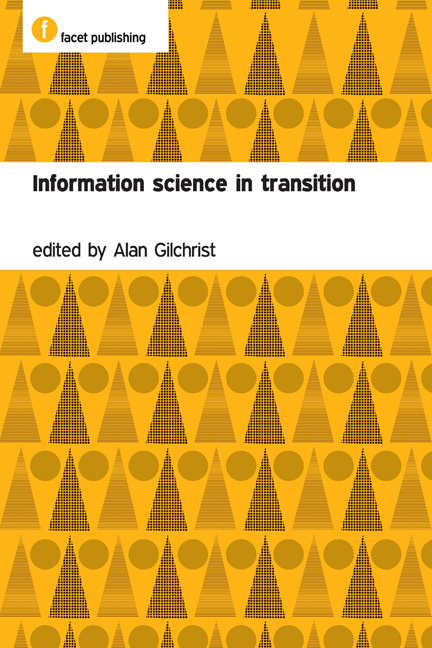Book contents
- Frontmatter
- Contents
- Contributors
- Preface
- Editorial
- Guest Editorial: Meeting the challenge
- 1 Fifty years of UK research in information science
- 2 Smoother pebbles and the shoulders of giants: the developing foundations of information science
- 3 The last 50 years of knowledge organization: a journey through my personal archives
- 4 On the history of evaluation in IR
- 5 The information user: past, present and future
- 6 The sociological turn in information science
- 7 From chemical documentation to chemoinformatics: 50 years of chemical information science
- 8 Health informatics: current issues and challenges
- 9 Social informatics and sociotechnical research – a view from the UK
- 10 The evolution of visual information retrieval
- 11 Information policies: yesterday, today, tomorrow
- 12 The disparity in professional qualifications and progress in information handling: a European perspective
- 13 Electronic scholarly publishing and Open Access
- 14 Social software: fun and games, or business tools?
- 15 Bibliometrics to webometrics
- 16 How I learned to love the Brits
- Index
13 - Electronic scholarly publishing and Open Access
Published online by Cambridge University Press: 08 June 2018
- Frontmatter
- Contents
- Contributors
- Preface
- Editorial
- Guest Editorial: Meeting the challenge
- 1 Fifty years of UK research in information science
- 2 Smoother pebbles and the shoulders of giants: the developing foundations of information science
- 3 The last 50 years of knowledge organization: a journey through my personal archives
- 4 On the history of evaluation in IR
- 5 The information user: past, present and future
- 6 The sociological turn in information science
- 7 From chemical documentation to chemoinformatics: 50 years of chemical information science
- 8 Health informatics: current issues and challenges
- 9 Social informatics and sociotechnical research – a view from the UK
- 10 The evolution of visual information retrieval
- 11 Information policies: yesterday, today, tomorrow
- 12 The disparity in professional qualifications and progress in information handling: a European perspective
- 13 Electronic scholarly publishing and Open Access
- 14 Social software: fun and games, or business tools?
- 15 Bibliometrics to webometrics
- 16 How I learned to love the Brits
- Index
Summary
Abstract
A review of recent developments in electronic publishing, with a focus on Open Access (OA) is provided. It describes the two main types of OA, i.e. the ‘gold’ OA journal route and the ‘green’ repository route, highlighting the advantages and disadvantages of the two, and the reactions of the publishing industry to these developments. Quality, cost and copyright issues are explored, as well as some of the business models of OA. It is noted that whilst so far there is no evidence that a shift to OA will lead to libraries cancelling subscriptions to toll-access journals, this may happen in the future, and that despite the apparently compelling reasons for authors to move to OA, so far few have shown themselves willing to do so. Conclusions about the future of scholarly publications are drawn.
Introduction
The scholarly publishing industry has been greatly affected by the digital era, because ‘the very content of the publishing business is, at the end of the day, a digitizable asset’ [1]. Scholarly publishers realized soon after the development of electronic databases in the early 1970s that ‘the content they acquire is an asset that can be manipulated and stored in digital form’ [1, p. 10] and, led by various experimental projects such as Quartet, a study of electronic journals funded by the British Library in the 1980s, they gradually over the next 30 years made the move from printed format to digital format, seeing it as a cheaper, faster and more effective method of getting their titles to their readers. Thus emerged the electronic journal, with one of the earliest launched in September 1990 (Electronic Journal of Communication). It was an early, free, online, peer-reviewed journal [2].
In this article, rather than looking back at the last 50 years of the scholarly publishing industry, some recent developments in the electronic scholarly publishing arena are considered. The focus is on the publication of primary scholarly information, i.e. publications that report original research findings (typically peer-reviewed), rather than on electronic abstracting and indexing databases (whose history has been well reviewed in [3, 4] and whose current situation can be gleaned from news items and comments in journals such as Online). There is also an emphasis in this article on electronic journals rather than e-books, as the e-book scholarly monograph market is very small at the moment.
- Type
- Chapter
- Information
- Information Science in Transition , pp. 299 - 322Publisher: FacetPrint publication year: 2009

